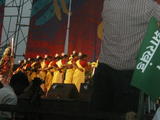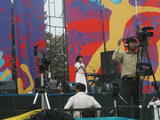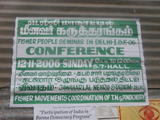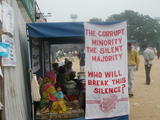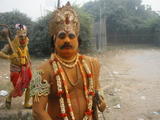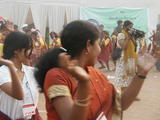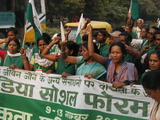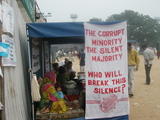Onyango Oloo Suggests A Way Out of Perennial Kenyan Conflicts
1.0. An Injury to One is an Injury to All
First of all let me say quite firmly that I am in FULL SOLIDARITY with the striking Kenyan university lecturers led by the University Academic Staff Union. Having followed on a daily basis the protracted wrangles over pay and other working conditions, I am amazed at their patience and wonder why it took them so long to take their long overdue job action of flinging their chalks on their blackboards and storming out of the theatre halls.
On Kenyatta Day I was invited to be one of the speakers at a mosque opposite the DOD headquarters in the Hurlingham suburb here in the Kenyan capital. The topic was hovering around the struggles of the Middle East and their relevance to the Kenyan situation. While there, I bumped into two student leaders from Kenyatta University. In the course of a short, friendly banter, I asked what the SONU and KU leaders were doing at a press conference the previous day denouncing the UASU call for a strike. They said that the action “would hurt students” and since they did not want to “suffer” they opted to oppose the strike.
I reminded them of how university students way back in 1980 backed the doctors strike of that year (even though some of the doctors were lecturers and some of the students were medical students) because students back then were at least politically aware enough to realize the truism of the South African trade union motto: “An Injury to One is An Injury to All”.
I put it to them that university students had an OBJECTIVE and even PERSONAL interest in supporting the right of university lecturers to a living wage and decent working conditions. Many of the students at Kenyatta and other public campuses aspired to be future lecturers. All hankered (hopefully) for future job security no matter which field they were pursuing.
I pointed out that it was a NATIONAL TRAGEDY that some of Kenya's best and brightest academics and professionals were lost annually, often PERMANENTLY in the one way brain drain precisely because of the sordid circumstances the UASU members were pining about.
Opposing the strike because of some temporary discomforts was in my view, terribly myopic and downright naïve and I told my two pals exactly that.
I am not sure if I managed to sway them over, but as I left, I saw both of their brows deeply furrowed with reflection.
Reading the papers today, I noticed that students at other campuses-like Egerton for example- are in solidarity with their lecturers.
But enough about that.
2.0. Why Is The Kenyan State so Adversarial?
I wanted to talk about something else.
I wanted to talk about how the Kenyan government- including local authorities, police and other arms of the state- deals with conflict in this country.
As we all know, there are lots of conflicts throughout the nation.
There are still ongoing skirmishes in the streets of Nairobi pitting hawkers baptized as gangsters against baton wielding and gun-totting city askaris.
Demolitions supervised by the cops are a common occurrence in the urban slums all over the country. The other day when a vehicle killed two members of a Mombasa street family part of the official response was to order for Mombasa to be cleansed of such alleged human vermin.
I do not know if I am the only one whose tummy churned when I saw a glowing report on page 3 of the Wednesday Standard of last week informing its readers quite happily that the Kenyan government- through the police- were quite happy with the new generation of deadly tear gas paraphernalia ordered a year in advance SPECIFICALLY to deal with “protesters” during the 2007 election campaign- this from the same NARC regime that Dr. Goebbels Mutua has been ululating about as having “expanded democratic space”.
The serpentine minister for Internal Insecurity is infamous for his shoot to kill orders and violent acts of reprisals against pastoralists accused of encroaching on “private” land etc.
We see how employers fire workers at the slightest provocation- even where such provocation is a legitimate and lawful appeal for workers’ rights to be defended.
Let us not even talk about the live bullets, the every present rungus and the fire hoses during rallies and street demonstrations.
Talking of the UASU strike, Kenyans saw with their own eyes, the dismissive arrogance of Dr. Newton Kulundu doing a media star turn as he proclaimed the UASU strike “unlawful”. We were aghast when he announced draconian actions aimed at shutting down UASU based on what, to quote him “I saw on television last night”- referring to a newscast where he was present at a meeting bringing together reps from the university administrations of the 6 public universities, the acting minister of education and former UASU Secretary General Kilemi Mwiria, the current UASU secretary general Dr. Muga K’Olale and other UASU members. The sheer impudence of Dr. Kulundu was mind-boggling even as it was telling- essentially there is no appreciable difference between Kulundu and a rural sub-chief, or his predecessor Najib Balala for that matter when it comes to dealing with conflict with people asking for their constitutionally guaranteed human rights.
This belligerent state attitude cannot be reduced to idiosyncratic psychological profiles of people like John Michuki and others.
It cannot be justified as “legitimate self-defence” and “appropriate reactions” from duly constituted law and order entities.
The adversarial and often violent institutional culture of successive Kenyan governments (there are volumes of scrap books on police, military, local government, game warden brutality to attest to this) is not mere happenstance.
The violence of the Kenyan state is part and parcel of the very identity of the Kenyan neo-colonial state. If it wasn’t violent in the particular way it manifests its aggression, it would no longer be a neo-colonial state.
Let me attempt an explanation.
3.0. The Nature of the Neo-Colonial State in Kenya
One of my favourite writers, philosophers and political teachers once observed:
“The state is, therefore, by no means a power forced on society from without... Rather, it is a product of society at a certain stage of development; it is the admission that this society has become entangled in an insoluble contradiction with itself, that it has split into irreconcilable antagonisms which it is powerless to dispel. But in order that these antagonisms, these classes with conflicting economic interests, might not consume themselves and society in fruitless struggle, it became necessary to have a power, seemingly standing above society, that would alleviate the conflict and keep it within the bounds of 'order'; and this power, arisen out of society but placing itself above it, and alienating itself more and more from it, is the state." (Engels)
Another one wrote thus:
...According to Marx, the state is an organ of class rule, an organ for the oppression of one class by another; it is the creation of “order”, which legalizes and perpetuates this oppression by moderating the conflict between classes. (Lenin)
The organs of the state include the police, the military, the prisons, the courts, the government bureaucracy, the laws and other ways of exercising class rule.
In the Kenyan historical context- the Kenyan state has NOT always been there.
True, there were city states along the Coast in places like Mombasa, Malindi and so on and we must not forget the Wanga Kingdom.
Generally speaking however, most Kenyan communities DID not, prior to the kinyanganyiro for Africa that culminated in the 1884 Berlin Conference, NEED states because, by and large, these were still largely egalitarian, non-stratified societies (save for the significant caveat of patriarchal subjugation of women) that did not need special coercive force to keep the wananchi in line with the diktats of the powers that be.
It was not until we were colonized that a need for some kind of a state arose in Kenya.
Again this evolved from the administration of the Imperial British East Africa Company between 1888 and 1895 through to the British Protectorate period from the mid 1890s to 1920 when Kenya was formally proclaimed a British Colony a reality that lasted until 1963 when the Union Jack was officially lowered on Jamhuri Day to usher in this long era of neo-colonialism- of which more shortly.
The violent nature of the colonial state in our country was fairly self evident when you trace how colonial rule consolidated itself in Kenya.
It was through military “pacification” campaigns, a thinly veiled euphemism for genocide, ethnic cleansing and collective state punishment, forced labour, compulsory taxation, religious brainwashing etc.
The colonial ordnances were by their very nature, odious, inhuman, racist and unjust laws that were put in place to protect the racist land-grabbers like Lord Delamare, the brutal exploiters like Brooke Bond and make it easier for the British Army to simply abduct and conscript Kenyan youth to serve by force in the two imperialist wars of 1914-18 and 1939-45.
The Legco (short hand for the colonial legislative council) was a haven for the settlers where they passed “sedition” and “treason” laws that outlawed legitimate democratic and independence struggles, legalized formal discrimination based on colour and creed and ensured that the agricultural and business interests of the European walowezi and their “home government” in the so called “mother country” of Great Britain were protected.
Christianity which has very strong social justice undercurrents, was in the Kenyan colonial context, an ideological tool for cultural imperialism. Of course we are referring to the organized quasi state churches like the Anglicans, the Catholics, and the Presbyterians fully conscious that the independent African church movement that included upstarts like Dini ya Msambwa, Legio Maria, Akorino, Nomiya Luo Church, Andu a Kaggia and others had their origins in the fermenting Kenyan nationalist movement.
The whole edifice of the colonial project in Kenya was thus bolstered by the existence of a violent state apparatus that did not hesitate to kill, maim, incarcerate, detain, outlaw, vilify, denounce anyone operating against the interests of British imperialism and the local racist colonial settlers and their homungati African collaborators.
Our struggle for national independence that culminated in the Mau Mau War in the 1950s gave rise to a negotiated settlement as the departing British colonial rulers identified and recruited sellouts like Kenyatta, Mboya, Ngei, Moi, Ngala, MacKenzie, Angaine, Okondo, Koinange and others to serve as apprentices and later the new nyaparas of the state after 1963.
At midnight on December 12, 1963, the Union Jack was lowered and the new, soon to be world famous red, white, green and black Kenyan flag was unfurled.
That move also ushered in the era, NOT of “independence” BUT DEPENDENCE; not of “Uhuru” but “Not Yet Uhuru”; in short that fateful December day in the early sixties proclaimed the birth of the NEO-COLONIAL STATE in Kenya.
Why the “NEO” before colonial state?
Because it was NO LONGER the OLD colonial state lorded over by the Delamares, Barings, Cavendishes and Michael Blundells. There was no longer a British mzungu guy sleeping over in the Governor’s mansion, but a very Black African snoring in the State House.
The house was simply painted another colour- it was the same house, LITERALLY.
What, for instance, happened to the old colonial ORDNANCES?
Quite literally, the word ORDNANCES was crossed out to be replaced by the word ACT with the laws remaining intact. The old sedition laws used to prosecute the Mau Mau fighters were retained word for word. Even the lifting of the ban on the Mau Mau was not lifted until 2005 if I am not mistaken!
There was no significant shift in the land and agrarian policies- no attempt to rescind the odious Maasai “agreements”; very little moves to challenge corporate ownership or improve the conditions of the Kenyan workers; rural Kenyans were still corralled in their ethnic enclaves aka “NATIVE RESERVES”; the so called Northern Frontier District remained under strict, draconian, racist military rule, cordoned off from the rest of Kenya; social and economic policies did not budge very much from the colonial status quo. The Africans who had served as non-commissioned underlings in the colonial period like Mulinge, Ndolo and others became the new officers- often, like in the air force, still serving under white masters. In the police, the colonial collaborators like Hinga, Gethi etc rose up the ranks while their civilian equivalents like Njonjo, Nyachae, Mahihu, Mathenge, and Oyugi etc started their meteoric careers in public administration and national politics.
Note that the mentality in terms of training the prison guards, police, chiefs, DOs, DCs, PCs etc remained colonial and backward in nature.
Economically we no longer just served “our” white British masters- we now had the French, the Germans, the Italians, the Japanese led by the Americans to cater to as well- while being reminded to kow tow as well to the World Bank, the IMF and other imperialist controlled multilateral and bilateral agencies as well. Playing its role as the global cop, Uncle Sam set up a sophisticated CIA listening post in Nairobi and was later to create military bases in Mombasa, Embanks, Nanyuki and elsewhere.
Look at our learned magistrates, judges, state counsels and lawyers: they still wear those silly woolen wigs on their learned noggins!
The Kenyan neo-colonial state has remained just as brutal and violent as its colonial ancestor.
4.0. What About the Struggle for Democratic Reforms in Kenya?
So?
Well, what about those?
What is your point?
We know that some of the worst excesses and dregs of orthodox colonialism were wiped away decades ago.
The Kenyan people through their resolute struggles have won a number of democratic victories which have helped to use that odious Mutua-linked term, “expanded democratic space”.
It is true that there is greater freedom of speech and expression today. It is true that the media is fiercely fearless in fighting for its freedoms. It is true that Kenyan women are in a much better social position compared to say, the 1920s and 1930s. Our parliamentarians are to a certain extent elected fairly and squarely if you ignore the cash handouts, institutionalized rigging mechanisms and low voter education during the non- issue election campaigns.
It is also true that we are closer to realizing the dream of promulgating a democratic constitution today than for instance 20 or 30 years ago.
What is also true that the NEO-COLONIAL STATE is still very much a reality, despite the three successive governments we have had since 1963.
There is a direct line from Kenyatta to Moi; from Moi to Kibaki; from Kibaki to whichever ODM chieftain will replace Kibaki next year- yes, he is going out alright no question about that.
Jomo Kenyatta sold out to the imperialists in prison; Daniel arap Moi was a darling of the settlers from the fifties; Kibaki has been a member of KANU almost from its very inception and is currently in cahoots with the neo-liberal snake oil salesmen from Bretton Woods. Most, if not all of the ODM leaders have been in KANU at one time or another.
Moi was Kenyatta’s Vice-President; Kibaki was Moi’s Vice-President; the ODM-President Elect is most likely one of Kibaki’s former ministers.
Governments have come and gone in Kenya- the neo-colonial state remains.
That is why I said at the outset that the key to understanding Michuki and Kulundu is NOT to investigate whether or not their respective mothers dropped them on their arrogant heads when they were three years old or whether Kajiwe cursed either of them.
The key is to understand the role of mainstream politicians as cogs in the neo-colonial state machine.
Unless the Kenyan neocolonial state is TRANSFORMED into a new Kenyan NATIONAL DEMOCRATIC STATE, all the ills, all the conflicts, clashes, diktats and ultimatums I cited at the outset of this essay will continue.
Therefore, the key to resolving conflicts in Kenya today is very much tied up with the project to develop a new non-sexist democratic constitution based on the aspirations and inputs of the Kenyan people.
The question of how to grasp that constitutional holy grail is outside the scope of this essay- and in any case, has been tackled by this writer elsewhere.
5.0. Towards a Conflict Transformation Mindset in Kenya
Having stated quite boldly and baldly if not badly that the promulgamation of a new democratic constitution within the context of a newly liberated national democratic state is the sine qua non for setting the stage for conflict transformation in Kenya, let me cite some very UNORIGINAL ideas that I borrowed heavily from a web site I will direct you shortly.
Have you ever heard of the THIRD SIDE?
Well, if you haven’t, here goes….
Who are Thirdsiders?
Here is a quote for you dear reader:
The Third Side is a way of looking at the conflicts around us not just from one side or the other but from the larger perspective of the surrounding community.
Taking the Third Side means:
Seeking to understand both sides of the conflict
Encouraging a process of cooperative negotiation
Supporting a wise solution - one that fairly meets the essential needs of both sides and the community
You can have natural sympathies for one side or the other and still choose to take the Third Side.
Who are the Thirdsiders?
Any of us can take the Third Side anytime
at home, at work, in the community,
and in the world.
What are the assumptions of the Third Side?
Here you go:
That conflict, in itself, is not a bad thing. Conflict is a natural and healthy process, necessary for making progress and dealing with injustice. The world may actually need more conflict, not less, if the appropriate skills are known and conflict can be managed productively.
That the goal is not to end or eliminate conflict but simply to transform the way it is expressed from destructive forms such as violence, abuse, and intolerance into constructive forms such as debate, dialogue, negotiation, and democracy. Conflict is inevitable; violence is not.
That the way to transform conflict is to create a strong container for creative contention. This container constitutes the Third Side of any conflict. The container can be created by the surrounding community-friends, neighbors, witnesses, neutrals -- as well as by the parties themselves.
That you don't have to take sides in a conflict, nor do you need to be neutral. No matter where your sympathies lie, you can choose to take the Third Side, in other words, the side of the whole whether that is the family, the work organization, the community, or the world.
That you can choose to take the Third Side anytime in the conflicts around you. This means seeking to understand all sides to the conflict, encouraging a peaceful nonviolent process for engaging deep differences, and supporting an inclusive outcome that addresses the essential needs of all
That responding to conflicts productively requires courage, preparation, knowledge, skills, creativity and coordination.
That you have an important role to play in transforming the conflicts around you, whether you are one of the parties or a Witness to the conflict. You can make a significant difference.
That by working together in a systemic way, we can create a strong Third Side for even the most intractable conflict. As the old African proverb goes, "When spider webs unite, they can halt even a lion."
The Third Side is not a new idea. In some form, it exists in every culture. Indeed it is the most ancient human processes for dealing with deep differences. It does not belong to any group or organization; it is the common heritage of humanity. It belongs to you.
What are some of the essential Third Side Skills?
Here is a summary:
See from the Thirdside
When we take the 3S we are often trying to influence the situation. The truth is, we can't even hope to influence other people unless we can influence ourselves. The first challenge we face is to gain perspective.
Listen from the Thirdside
We tend to view ourselves as "in the right" when engaged in a conflict. Our internal judgments & biases can interfere with our ability to understand the differing perspectives in a conflict & therefore can make it difficult to find a solution that everyone can accept. In order to explore for possible agreement we need to learn to listen to all perspectives and consider the whole picture.
Speak from the Thirdside
The words and actions we choose influence the conflicts around us. Speaking from the Third Side has the power to transform potentially violent conflicts into opportunities for collaboration. Once you have gained a view of the whole situation, it is easier to suggest that the parties involved work together to create a solution.
I sincerely believe that the Third Side approach is worth a third look.
Like I said, these are words and concepts that I have lifted directly from the Third Side website.
Please visit the site and peruse through it.
Whether or not we as Kenyans can apply these concepts to deal with our home-grown conflicts is of, course, practical question that can only be verified by our conscious, voluntary and unwavering interventions into actual conflict situations on the ground.
Peace!
I am outta here…
Onyango Oloo
Nairobi, Kenya
